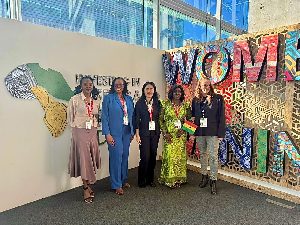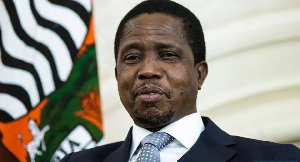The loan rush is certainly on as far as the government of President JEA Mills is concerned. It seems the preprogrammed response to most things to deal with the fulfillment of the Better Ghana Agenda is to negotiate a credit facility.
Just this week, Parliament has been presented with loan agreements, totaling 806.9 million euros (US$1,119,000,000). This includes a 300 million euros(US$416m) credit facility from a little known financial upstart, General Capital Corporation of New York, US,owned by Dr. Anthony K Nyame, a company with 4 employees, according to its own profile, which says it is hoping to get into the export business. This loan is ostensibly to finance “the completion of a total of 391 uncompleted projects for the Ministry of Health.”
This recent loan rush by the National Democratic Congress, obediently supported by its slim but effective majority in Parliament, comes on top of the $1.5 billion STX loan and the $13 billion or so Chinese credit facility, yet to be put before the House.
It is worth reiterating that it seems the Government of President Mills sees loans as the all-in-all resolution to most of Ghana’s economic problems. This is, in our view, a very dangerous and unimaginative way to offer leadership to a country that has struggled for the past 50 years to find its way on the development racecourse. By this, President Mills appears to be using his four-term in office to mortgage the future of this country’s youth and children and generations yet unborn.
Our concern with this kind of loan rush attitude is deepened by what took place last week when the Joint Committee of Finance and Mines and Energy met in Koforidua to work on the Oil Revenue Management Bill. The proposed amendments from Government are a matter of deep concern to us. (More on this in our subsequent release).
We are reliably informed that Government intends to delete the clause that bars any government from using Ghana’s oil and gas resources to guarantee loans and, instead, insert: “In order to meet the country’s infrastructure development needs, Government may borrow against its share of proven petroleum reserves, exclusively for the infrastructure development needs for a period of ten years after the commencement of this Act.”
What becomes immediately clear, if we may stress, is that President Mills is bent on using his four-year mandate today to determine for future generations how revenues from their oil and gas resources were(not are to be) spent (even before their time).
It is a dangerous cul-de-sac to a better future which should be resisted or, at least, subjected to wider and deeper public debate before the Bill is even brought before the House, where we all know too well that the Majority is likely to have its way, in spite of any meaningful reservations that may be expressed by civil society.
For the month of November 2010 alone, on Tuesday 9th November, the Finance Committee of Parliament met to discuss a 55.5 million euro credit facility between Government of Ghana and Kreditanstalt fur Wiederaufbau (KFW) of Germany to strengthen the Ghana Audit Service.
Also, presented was a buyer's credit facility of 9.4 millioneuros with KfW Frankfurt AM Main for the supply of ambulance vehicles and spare parts for the National Ambulance Service.
But, what must catch the greater attention of Ghanaians are two loan agreements laid before the House on the same Tuesday,totalling 742 million euros. This comprises of 442m euros for the supply of 200 ambulance cars, 50 mobile clinics, 2 air ambulances, 10 educative mobile units, construction of 12 District Hospitals and technical training in Ghana. The lender is Opus7 s.r.o Limited of Austria.
There is also very little history about the operations of Opus7. What our search has so far found is the Opus ImmobilienPrahas.r.o. in Prague, Czech Republic, which commenced operation in Prague in the autumn of 1994. Its stated main areas of business are“investment in and development of residential and commercial premises and property brokerage of sale or lease of real estate property.”
The next facility before the House this week is that 300 million eurosloan agreement between the Government of Ghana and theGeneral Capital Corporation of New York, US,a company which operates from 1201 Broadway, Suite 608, New York, New York, 10001. Its chairman and CEO is Dr. Anthony K Nyame. General Capital Corporation is also requesting“for tax and duty exemptions on services and vehicles, spare parts and other materials to be procured and supplied or imported in respect of the loan.”
The lightning speed with which Ghana’s external debt has increased in the first 22 months of the NDC government and the quality, value for money issues and purposes for which these loans are being contracted should be amajor cause of concern for all well-meaning Ghanaians.
Even before the above huge loans were contracted, by June 2010, Ghana’s external debt was already $10.4 billion as compared to $7.9 billion, 18 months earlier.
Thus, with the revised GDP figures using 2006 as the base year, Ghana’s public debt is still rising beyond the level of comfort for the country’s future development. It currently stands above 60% of GDP, as compared to 44.5% of GDP in December 2008, even with the revised GDP.
General News of Wednesday, 10 November 2010
Source: : www.danquahinstitute.org












